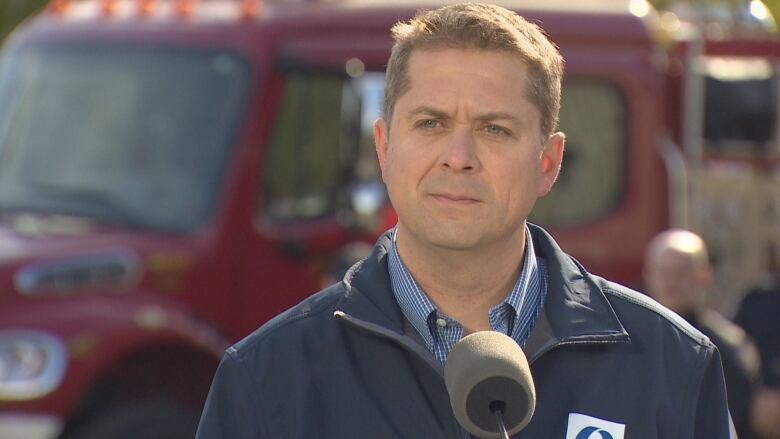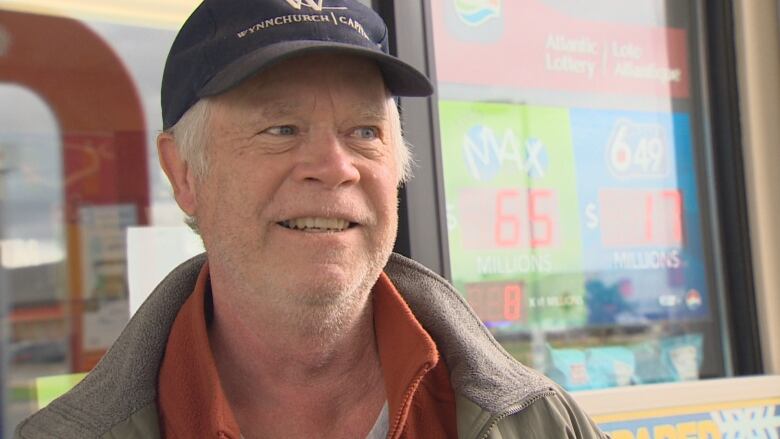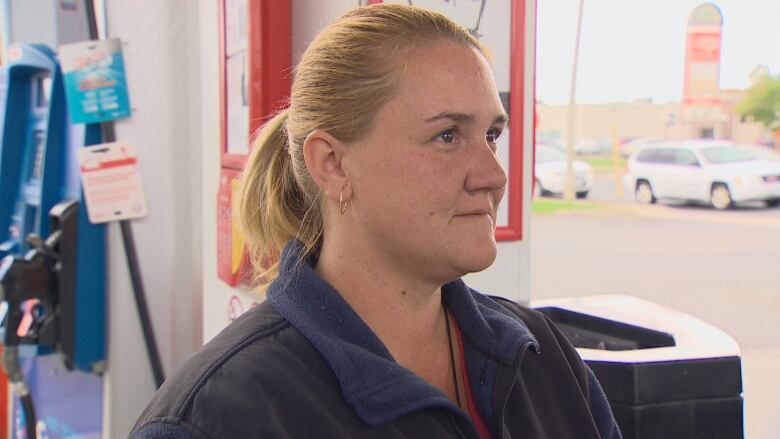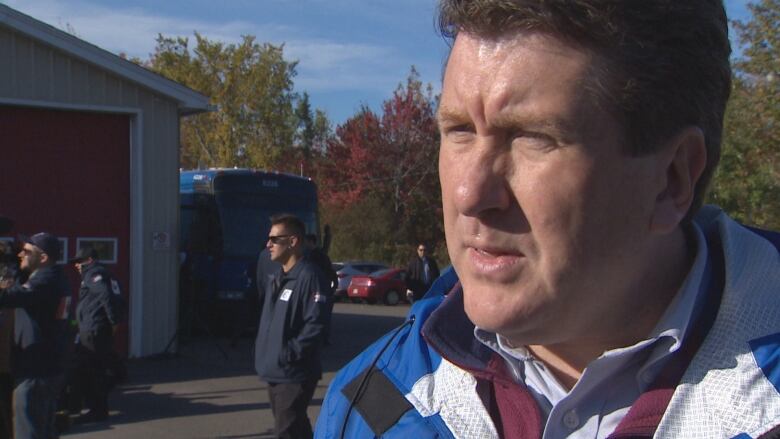Carbon tax not the election-defining issue Tories wish it would be
Some voters shrugging off Conservative leader's carbon tax crusade

Conservative Leader Andrew Scheer's latest New Brunswick campaign stop this week included a familiar refrain: the need to repeal the dreaded federal carbon tax imposed by Justin Trudeau in April.
"If he's re-elected, his carbon tax will only go up," Scheer said during an event in Upper Kingsclear, near Fredericton.
The Conservatives were counting on turning the Oct. 21 election into a national referendum on the carbon tax, especially in provinces that refused to establish their own and had Ottawa impose its version in April.
Last year, Scheer appeared on a Maclean's magazine cover along with Conservative provincial premiers vowing to fight the levy in the courts and at the ballot box.
But at least some voters are shrugging off the crusade against the tax, which adds 4.4 cents per litre plus sales tax to what they pay at the pump.
'You have to pay and that's it'
Jim Stevenson of Fredericton said he noticed the tax during the summer "but prices seem to have gone down since then."
He said he recently drove to Montreal, a sign the tax hasn't changed his driving habits. It also won't affect his vote. "It's another tax you have to pay and that's it."

Businesswoman Andrea Meade, who was filling up a company car she drives to clients throughout central New Brunswick, said the carbon tax doesn't register in her mind when she's at the pumps.
"Not really," she said. "It's the cost of doing business I just came back from Chipman. If we've got a job to do, we go do it.
"It's not going to be one of the defining factors" in her vote, she said. "I think there's a lot of other issues that we'll look at. We don't want a Trump up here."
Others are very aware of the tax and will vote on that basis.
"I think it's ridiculous. I don't think it's working at all," said Natalie Constantine of Lincoln, who works two jobs and said she can't afford a more fuel-efficient car than her SUV. "How much more do we need to spend before we can get a break?"

But most drivers were far from riled up.
"I try not to live around my car," said John Geldhart, who called the carbon tax "a very narrow issue."
"There's a global question of what we're doing to invite change in our behaviours that's going to make a difference."
Earl Bryson of Saint John said he has other reasons to vote against the federal Liberals but the carbon tax isn't one of them. "I guess we kind of gotta swallow it and go from there."
Gas cheaper than pre-tax price
Ottawa imposed the carbon tax, and a system of rebates, on April 1, after the new provincial Progressive Conservative government refused to create its own carbon price for consumers. The federal tax is set to rise each year until it reaches 11 cents in 2022.
For now, though, many drivers appear to have incorporated the April 1 tax increase into the pattern of regular weekly price increases and decreases set by the Energy and Utilities Board.
The week before the tax was imposed, the EUB's maximum price for a litre of unleaded regular gas was 123.8 cents. The carbon tax bumped it up to 128.9 cents on April 1.

But this week the maximum price is down to 122.1 cents below the pre-tax level in March, even with the tax now included.
That could explain why some drivers aren't making dramatic changes in their habits or showing much anger about the tax, said Brandon Schaufele, an economist and public policy expert at the Ivey Business School in London, Ontario.
"Given New Brunswick's pricing scheme, maybe that doesn't materialize in New Brunswick," Schaufele said.
Even so, Schaufele said, "that's not necessarily a bad thing" because the higher cost of gas will still lead some people to consume less gasoline and emit less carbon dioxide, even if they aren't conscious it's happening.
"People will buy less gasoline when it's more expensive," he said. "Maybe you and I won't, but somebody maybe defers a trip. Somebody maybe bundles two trips together."
Climate change top of mind
Another possibility is that recent examples of extreme weather, including two consecutive major spring floods on the Saint John River in 2018 and 2019, has more voters willing to accept tougher climate measures.
An Abacus Data poll in late August said 55 per cent of Atlantic Canadians consider climate change an urgent issue, the second highest level in Canada after Quebec.
And 52 per cent supported either taxes or a combination of taxes and incentives to tackle climate change, the highest level of support in Canada.
Not surprisingly, Scheer said during his New Brunswick stop this week that the anecdotal comments from gas station customers in Fredericton don't match what he is hearing.
"The voters I've heard from are frustrated by the fact they have to pay the carbon tax," he said.
Scheer's Conservative candidate in New Brunswick Southwest said he's also hearing a lot of complaints about the carbon tax from voters he meets at the door.
"They recognize that under the Liberals, if they re-elect them, that carbon tax is going to keep going up, and I would say most people that I speak to want it gone and they agree with our promise to do just that," said John Williamson.
Scheer and Williamson both bundled that commitment into a package of other promises, however, casting them as an effort to make life more affordable.

Those commitments include removing the HST from home heating fuels and issuing home renovation tax credits.
"People like all three of them," Williamson said. "I think people make their decisions based on a number of factors, and I think getting rid of the carbon tax is going to be one important factor."
Scheer also said that if voters are forgetting that it exists, "it's also proof that the carbon tax isn't working. If it's not changing behaviour, it's not working."
That's a logical supposition, but Schaufele said a tax doesn't have to be visible to work.
In fact, the Liberals may have found a political sweet spot: a tax that's high enough to nudge the habits of some drivers enough to lower emissions but low enough that consumers won't notice it or get angry about it.
"Maybe ... the carbon tax floats under the radar a little bit. It doesn't mean it's not going to achieve its objectives," he said.
"Gasoline is still going to be a little bit more expensive. People are going to have an incentive to drive fuel-efficient vehicles but maybe it's not front of mind come the election."












_(720p).jpg)


 OFFICIAL HD MUSIC VIDEO.jpg)
.jpg)



























































































